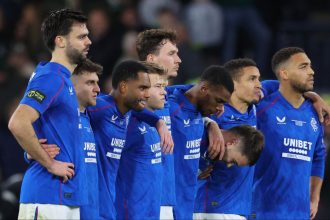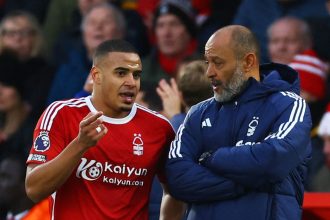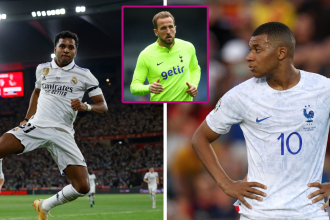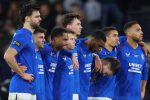In five years, BPC has become instrumental in the way MLS identifies racism and educates players on discrimination
It has been five years, and Allen Hopkins is more motivated than ever. As he surveys the American soccer landscape, the executive director of Black Players for Change has seen, well, change.
The organization has now been around for half a decade. Introduced to offer support to Black and minority footballers and stakeholders in American soccer, Black Players for Change began as a meeting of minds, and has since expanded into an important and powerful non-profit organization.
It has become instrumental in the way Major League Soccer identifies racism, approaches social issues, and educates its players on discrimination in the sport. And for the players themselves – those with individual causes and concrete passions that fight against racism and discrimination in local communities – it offers foundational support. And despite the latest wave of political and social vitriol that has swept through the United States, the organization, five years in, is showing few signs of slowing down.
“It's that spirit of unity, collaboration, partnership,” Hopkins told GOAL. “You know that when all those things, the hard things – they call them soft skills, yeah, really the hard skills – when those things come together like that is when we're really going to get to a place where we feel like we're the best in the world."
IMAGN'There were these islands of isolated success'
It started with the nine minutes and 29 seconds that a police officer knelt on George Floyd’s neck in 2020, a fatal act that sparked outrage across the country. And the bullet that caught an unarmed and innocent Breonna Taylor – another interaction turned fatal. There were countless other incidents, some reported, some unreported and cast aside.
But amid the turmoil of the time, the Black Lives Matter movement – one that had seemingly gone quiet for five years – resurfaced. From a sports and soccer perspective, it led to the founding of Black Players for Change. Jeremy Ebobisse, co-founder, is quick to emphasize that this didn’t all happen just because of the political and racial turmoil of 2020.
The organization's core sentiments – the idea of a fight for equality through sports – had always been there. In a strange way, it just needed a catalyst.
“We were all dealing with COVID and George Floyd, and there was a really raw, raw time in our country. And one of our biggest achievements is just the formation,” Hopkins said.
The premise was relatively simple. MLS is among the more diverse professional sports leagues in America. There are athletes – African-American, Afro-Caribbean, Afro-European, among others – all over the country that have causes they support and concerns they’ve raised. Hopkins, Ebobisse and the Black Players for Change founders sought to create a platform for an organized approach to help confront and address those issues.
Want to raise awareness, and make real change? They figured there was strength in numbers. There were, admittedly, individuals who had made strides in their communities. It wasn’t as if no one was pushing for change – or fighting for a message. But Hopkins admitted that unity could only increase their chances of success.
“There were these islands of isolated success, that’s where Black soccer was… there were a lot of amazing people who were successful, but we weren’t connected as a community,” Hopkins said.
AdvertisementIMAGN'I want to support you'
Black Players for Change didn’t grow immediately or exponentially. But little steps were made here and there. Individual players found support for their causes, with both financial and PR backing. Some of it was social media messaging to raise awareness. Other instances included getting involved in communities, building soccer pitches and partaking in activism through the game.
“Some people need money for their nonprofit,” co-founder Justin Morrow said. “Some people need attention. Some people need connections. But like I said in the beginning, because of this role that we've been able to carve out in the stakeholder group, decision makers in the sport we're able to funnel resources.”
Morrow took on issues to do with gun violence in his hometown of Cleveland, working with psychological mental health services for people who have been victims. He has fought for more job opportunities and to address root causes of gun violence. Former Philadelphia Union forward C.J. Sapong has a nonprofit dubbed “Sacred Seeds” that helps deliver healthy food to urban communities that otherwise would have little access.
“There’s more collaboration, more awareness, more of an ability to just connect with people and say ‘Hey what are you doing? OK, cool. I want to support you,’” Hopkins said.
Getty Images'We just wanted accountability'
Black Players for Change is a non-profit organization, but it benefitted from strong support from MLS and Commissioner Don Garber early on – both in terms of informal conversations and concrete financial backing.
“Commissioner Garber really said, ‘I want to help the players,’ “ Hopkins said. “It was his commitment and the league's commitment to really financially support BPC, helping get off the ground, that the players needed to go back and be heard in their markets. It was that league support waterfall down the clubs, and that allowed each player in these markets to find a little bit more of themselves in this work.”
It’s something that the league has continued. Beyond the individual moments with players and causes, across the American soccer landscape soccer at large, Black Players for Change can point to numerous examples of success. The first is perhaps the most visible: in 2023, there were 13 on-field racist incidents in Major League Soccer. In 2024, there were zero reported incidents.
Part of that came about as a visceral response, with more awareness of past incidents. Kai Wagner is a textbook example. An MLS investigation confirmed that the Philadelphia Union defender directed a racial slur towards New England Revolution forward Bobby Wood in October 2023. Wagner was suspended for three games as a result of violating the league's anti-discrimination policy.
“No one ever asked Kai Wagner to be removed from the league,” Ebobisse said. “We just wanted accountability, where people could admit that they made mistakes, so we could just move their process of healing as brothers who play against each other on a regular basis – because that's so important.”
Allen Hopkins'Create the understanding of the pipeline?'
Meanwhile, the organization can also be credited for contributions to MLS. Black Players for Change helped craft an anti-discrimination policy in February 2024. It is among the first of its kind in professional sports.
There are newly implemented diversity hiring policies that support not only Black candidates, but also those of a variety of backgrounds. The Hometown Heroes initiative, started around the 2022 All-Star Game, brought awareness and highlighted positive impacts made in various communities.
But while the league may be trending the right way in terms of the 22 men on the pitch, there are strides to be made elsewhere, Hopkins said. Last year there was just one Black head coach in MLS. This year there will be three – Wilfried Nancy of the Columbus Crew, Robin Fraser of Toronto FC and Pascal Jansen of NYCFC. A significant increase is positive, Hopkins argued, but there remains work to be done, especially with such a small sample size.
Now the work continues as to how to ensure that those numbers multiply. That’s a key area of focus.
“How can we create the understanding of the pipeline and the pathway that people need to take to get there?,” Hopkins said. “To me, the next exciting part about this journey is really coming together with people and elevating those in these decision making positions.”






